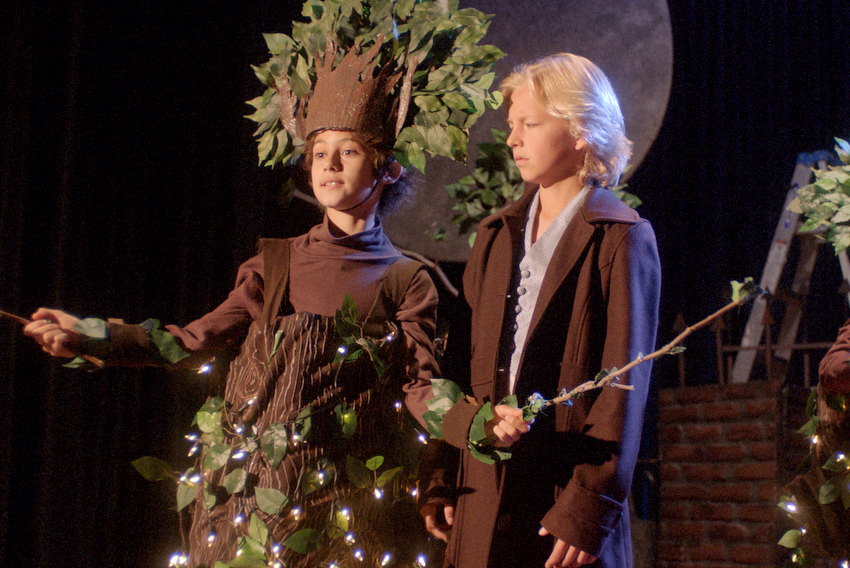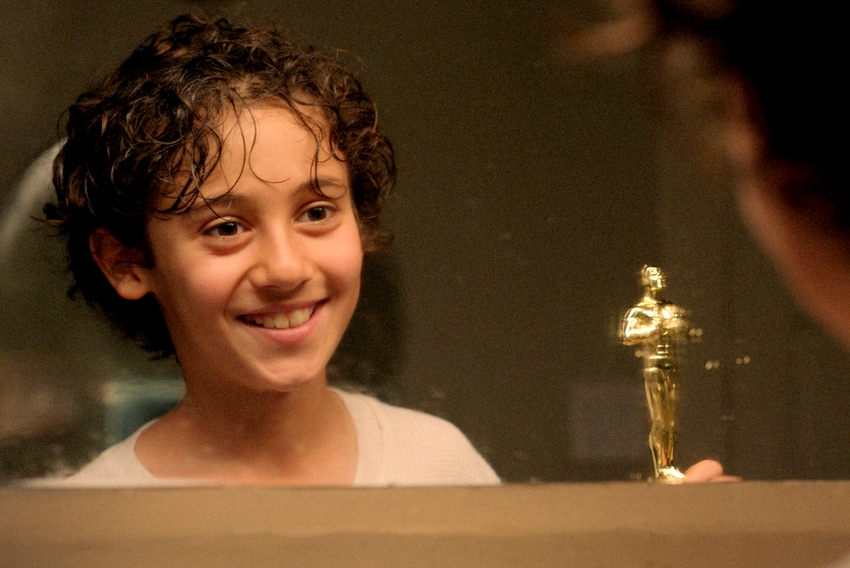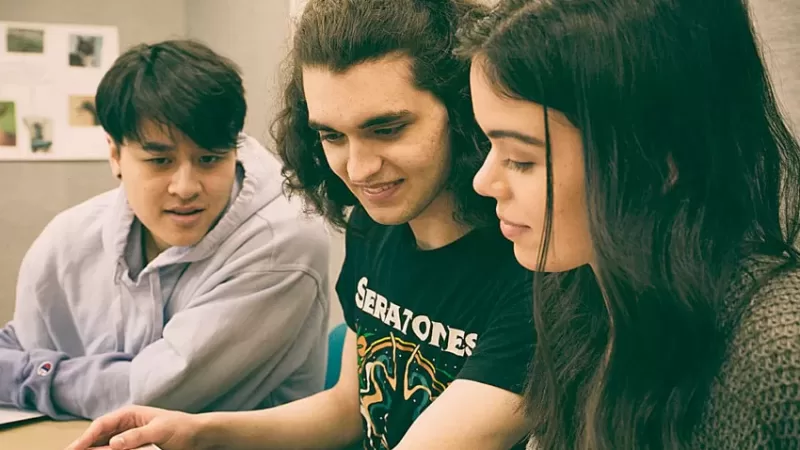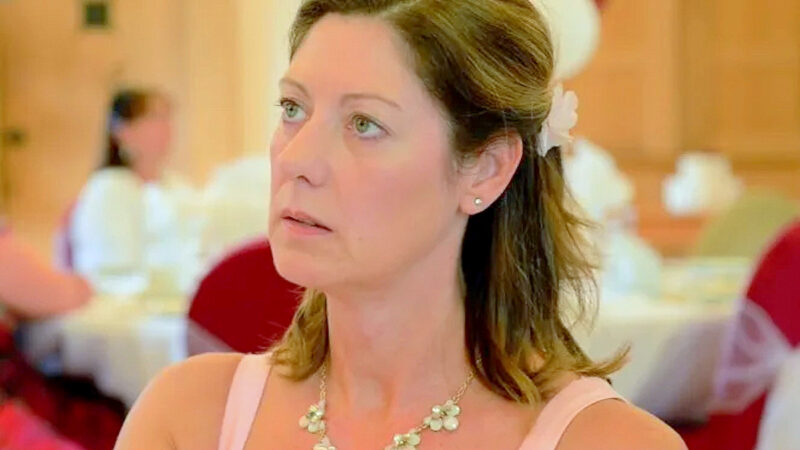
indieactivity : Give a background of your personal experience with the story, writing and the production?
Omer Ben-Shachar : Tree #3 is based on my experience growing up in Texas as a newly immigrated boy. But it wasn’t always clear to me that that was the story I wanted to tell. In fact, in the early stages of our film’s development, we were going to do a Sci-Fi story titled “Lost & Found.” But each time my co-writer and I met to work on it, I found myself returning to my childhood in Houston, Texas, and the memory of how my accent prevented me from landing a speaking role in the school play. I remembered the devastation I felt each time I saw my name next to a background role and how, to make myself feel better, I would put on my own plays in my living room, and cast myself in the lead.
It wasn’t the hardship, or even the comedy of the situation, that drew me to tell this story. It was the passion. I really wanted to tell a story about a passionate kid who would go to extremes to make himself the star of his own show. I wanted to be close again to that 12-year-old boy, not to remind myself of how it felt to be rejected and excluded, but of how it felt to not surrender. That young boy never gave up. He was such a believer, so committed to his art and so passionate about trying to excite an audience. I wanted to be inspired again by his energy, and in making this film, inspire others. I realized the story I needed to tell was my own.
Related Story : Tree #3, Looks at the Prejudice Immigrant Children Face in Schools
indieactivity : Did you start writing with a cast in mind?
Omer Ben-Shachar : I didn’t start writing with specific actors in mind, but I had a very specific idea of who our lead kid needs to be, especially since he was largely based on my younger self. We needed a kid that was great at “putting on a show” but that was also authentic and genuine. We needed a kid that was very charismatic, energetic and captivating but also shy, sensitive and insecure. And on top of that, he needed to have an English accent, and speak Hebrew! We were looking for a miracle – and somehow, we found it! Lior Malka, the lead boy who plays Itai, was all of that, and much more. We were so lucky to find him.
indieactivity : How long did you take to complete the script? (Do you have a writing process?)?
Omer Ben-Shachar : It’s interesting for me to talk about the writing process, since it’s hard for me to know where we even started, and what’s considered the beginning. It kind of feels like that game, Snakes & Ladders. You make some progress, then fall way back, only to somehow make it to the finish line.
In the first two months, my co-writer and I barley wrote a single word, but instead just had conversations about the story. We kept discussing the movies we like to watch, what we like about them and why our story fits those movies. We talked about why this movie matters to us and why it will will matter to others. Only when we felt like this story HAD to be told, and that we were experts in it, did we start writing. At times it felt like we were wasting our time. “Why didn’t we write a single word yet?” I would ask constantly. But in retrospect – this stage was very important. We were looking for the heart of the project.
About four months later, once we had a good draft, we started sharing it with everyone we knew – our team, other students, teachers, family members and friends. We were obsessed with trying to please everyone’s notes. In retrospect, I know that that’s never going to be possible. But at the time, that was our goal – we wanted to write a script that everyone will like. Only toward the end of the process, we began to realize that the only way to make this film great was to try and please ourselves. If we love it, others will too.
indieactivity : What was your first project?
Omer Ben-Shachar : My first project was called “Things You Can’t Replace.” I made it after I had gotten back home to Israel after a few years of living abroad in Texas. We shipped most of our belongings in boxes, but I was given one suitcase to bring all of my valuable things: my drawings, photos, notebooks, memorabilia collection; everything that meant something for the young collector I was. However, while the boxes made it home safe, the suitcase didn’t. In the 30 days following our arrival, I called the airport every day to check if the suitcase had been found, until it was officially declared lost. It was hard for me to grasp the idea that there was nothing I could do to bring it back. Calling the airport, making lists of the lost items, crying about it, buying replacements – none if it brought my lost items back to me.
At the same time, I was introduced to filmmaking at my new Israeli school. Our instructor urged us to make movies about the things that “kept us up at night.” I took his advice quite literally and made my first film about a boy who loses his suitcase. Through the process, the impossible happened: I brought my lost items back. Thanks to the movie, I stopped caring about what was lost, and moved on to what was found: cinema. Since then, I’ve always continued to make movies about the things that keep me up at night.

indieactivity : Which scene (that made the cut) was the hardest to shoot?
Omer Ben-Shachar : I was going to say the finale, the last big theatre scene, because of the amount of background talent and setups and choreography involved in it. But if I’m being honest, the hardest scene was actually a small, intimate scene, in an empty hallway, with only three actors. And the reason, was that the scene wasn’t written well enough. Since the characters’ motivation wasn’t fully fleshed out, it made it difficult to stage it. It was hard to know where the actors need to be standing if it’s not clear what they want in the scene. Because of that, it was also hard to figure out the right camera lenses. And lastly, it was difficult for the actors to act it, because the dialogue didn’t feel natural. We ended up shortening it and adding another one instead. I guess it’s harder to shoot small scenes that aren’t written well than the most grandiose, complicated scenes.
indieactivity : What worked better in this latest production that mightn’t have worked so well in the last one you did?
Omer Ben-Shachar : Everything worked better! I feel like you improve so much from one film to the next. The writing, direction, casting, cinematography, editing, production designer – all was better than my last production. And a lot of that was thanks to the great collaborators I got to work with on this project.
I spent a lot more time on the writing of this one than any previous film I ever did. I used to think it was a failure to come into the editing room not knowing exactly what your story is. So, this time, as we were developing this project, I told myself that I’ll work the story so much prior to shooting – that there will be no questions left unanswered. Now, of course, there will always be unanswered questions. That’s the point! A film is re-written at least three times – in the writing, in the shooting, and in the editing. But the illusion that you can achieve a perfect script is what made us work on the writing as much as we did, which was by far more of an intense and deeper process than in my previous work.

indieactivity : Is there anything about the independent filmmaking business that you struggle with?
Omer Ben-Shachar : Juggling so many different hats! I learned that to be a great director, you should probably also be a great writer, and a great speaker, and a great listener, and a great graphic designer, and great at giving interviews (like now), and great at making friends, and great at yoga (still working on that).
indieactivity : Where do you think your strengths lie as a filmmaker?
Omer Ben-Shachar : I think I always look for the truth in things. In writing, I make sure every word could be something I would say. In filming, I make sure every action the actor does is something he would have done even if I didn’t ask him to. I know that if an actor doesn’t believe what he’s doing, neither will the audience. In post, I always test the movie with an audience, seeing if the viewers find anything to be unrealistic or inauthentic. And generally, I’m looking for the movie to say something truthful and meaningful about the human experience, that others can recognize in their own life as well.
indieactivity : How was the film financed?
Omer Ben-Shachar : It was self-financed.
indieactivity : What do you hope audiences get from your film?
Omer Ben-Shachar : I hope viewers watching the film will be inspired by Itai not to let others cast a role for them. Cast yourself as the star of your own show. During our development, our mentor, Michael, told me something that really spoke to me, and I think is still very relevant to the film’s message: Be yourself, and the audience will find you.
indieactivity : What else have you got in the works?
Omer Ben-Shachar : I’m writing a comedic feature titled “Unfit” about my experience in the Israeli army, and a show based on “Tree #3” (together with Sydney Meadow, co-writer). I’m also developing an animated show titled “Tanina” based on the Israeli children’s book about a witch and her talking cat. I’m also part of the Viacom Viewfinders Directors Program, where I will shadow on a Nickelodeon TV series.
Tell us what you think of the interview with “Omer Ben-Shachar” What do you think of it? What ideas did you get? Do you have any suggestions? Or did it help you? Lets have your comments below and/or on Facebook or Instagram! Or join me on Twitter @oladapobamidele
Follow Omer Ben-Shachar on Social Media
Website
IMDb
Facebook
Instagram
Vimeo
Jack Roper Joins Cast of Bruno Pischiutta’s Mega-Film Project, The Trilogy
British Actor Jack Roper joins Stephanie Tripp, Seven Grant, and Cristina Perez
The Exploding Boy by Monty Wolfe. The Micro-Budget Queer Coming Of Age Comedy
Monty Wolfe delivers an up-beat alternative to reboots, remakes, and sequels.
12 Year Old Actress, Sofia Carvalho: Emerges with a Bright Career Ahead
By Bruno Pischiutta









